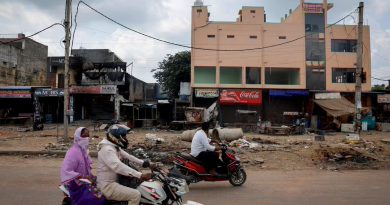Syrian refugees in Turkey face discrimination and racism: University Survey
Shockingly, one-third of the Syrian refugees in Turkey said they have faced xenophobia and racism…
Istanbul – Bahcesehir University’s Center of Migration and Urban Studies in Istanbul released a survey-based report on Friday highlighting the socio-economical challenges Syrian refugees face in Turkey everyday.
Ankara-based journalist Menekse Tokyay wrote a complete report about the University-survey in Arab News about the ongoing tensions between the Turkish residents and the Syrian refugees which have made the life of Syrians increasingly difficult.
Hatay province of Turkey which hosts around 439,000 Syrians — which makes upto a third of the city’s total population — where already-scarce resources are stretched to a breaking point, resulting in further ill feeling towards the refugees.
The survey includes a survey of 808 Syrians aged between 18 and 25 in two Turkish cities with large numbers of Syrian refugees — Hatay and Izmir, on Aegean coast, which host around 146,000 Syrians — in October and November in 2019.
The official figures state that there are 1.2 million Syrian refugees aged 18-25 currently living in Turkey, which makes a third of the country’s total population of Syrian refugees.
More than a half of these Syrian refugees, want to return home or move away from Turkey, because of their living conditions and the discrimination they face every day at the hands of the local Turkish residents.
Omar Kadkoy, a migration policy analyst at Ankara-based think tank TEPAV, said the university report highlights the structural shortcomings of Turkey’s “harmonization policy.”
“Bureaucracy is marginalizing skilled Syrians and preventing them from fulfilling their potential, hence depriving Turkey of needed, but underutilized, capabilities,” he told Arab News of Saudi Arabia.
The survey also stated that 45% of Syrian youth in Turkey neither work nor go to schools, and 86.6% cannot get a certificate of equivalence for their diploma and they cannot attend university or apply for jobs.
Sadly, only 4.6% of these refugees hold a Turkish work permit, due to which majority of them work in the informal sector without any social insurance, and are subjected to exploitation by their employers.
The reason they choose to work in the informal sector is due to the lengthy bureaucratic procedures involved in applying for a work permit.
According to Kadkoy, that same bureaucracy is exposing young Syrians to greater risks, especially in the age of COVID-19.
“Under normal circumstances, working informally already means being subject to various forms of exploitation. During the pandemic, working informally turns Syrians into a disposable workforce with only a fragile financial safety net to survive the economic consequences of COVID-19,” he said.
Survey states that, sectors like textile, construction and catering, hire young Syrians, but 78.8% do not receive their full salary each month. One fifth of the respondents complained about the low wages, while 16% of them complained about worst working conditions.
Over half of young Syrians reportedly work 9-10 hours every day, while one-third work for at least 11 hours — which goes against the Turkey’s employment policy. Half of the respondents claimed that they could not access public services or rent a house because of their nationality.
Survey further states that, at least three-quarters of young Syrians live below Turkey’s official minimum subsistence level, while only 4% receive financial support from the state.
Shockingly, one-third of the Syrian refugees in Turkey said they have faced xenophobia and racism, while one-fifth cited the language barrier as a major obstacle for their integration into Turkish society.
11% of the respondents said their contact with the local community was a very bad level.
According to Kadkoy, the fact that so many young Syrians are having a difficult time in Turkey and wish to leave will serve the government in two ways.
“Domestically, (the government) will complicate the lives of Syrians through bureaucracy. Thus, frustrated Syrians will opt for voluntary repatriation in the future. Therefore, the government delivers its promise not to host Syrians indefinitely,” he said. “Regionally, the government will exert pressure on Brussels for further financial support (in exchange for) keeping Syrians from reaching EU borders.”



